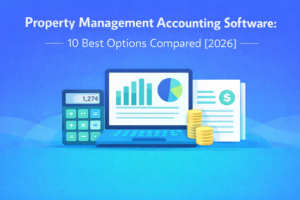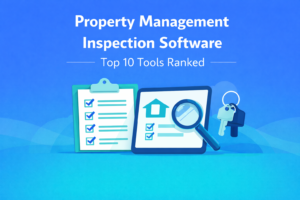
Artificial intelligence (AI) is becoming increasingly relevant in the real estate industry, transforming how property acquisition, management, and sales are carried out. AI has particularly impacted revenue management, making it a game changer for professionals in the real estate field.
In this blog, we’ll look at how AI is changing the industry, especially revenue management, and how professionals across the real estate spectrum can benefit from it.
The Crux of Revenue Management in Real Estate
Real estate pros use their know-how, gut feeling about the market, and intelligent plans to make the most money from their properties. Revenue management in real estate means finding ways to make as much money as possible from a property, like an apartment building or a store.
To do this well, you need to understand what’s happening in the market and make good choices to make sure the property stays profitable and successful.
With Artificial intelligence (AI) getting better and cheaper, real estate earnings could skyrocket. Using AI in revenue management changes real estate a lot. AI is really good at handling lots of data and figuring out patterns.

In real estate, AI can help by looking at things like market trends, past data, and how people behave as tenants. It helps with pricing, predicts market trends, and gives tenants what they need. It brings significant benefits like more money and happier customers.
This new way of doing things is a big deal for real estate. As it helps property owners and managers make better decisions and find ways to make more money while running things more smoothly.
AI in Revenue Management
You see, AI has a significant impact on real estate revenue management. AI can provide unmatched analysis and decision-making support by utilizing advanced algorithms and machine learning. Let’s see what AI can do when it comes to revenue management.
Automation of Pricing Strategies
Before, people would set prices and keep them the same. But now, with AI, pricing strategies are much more flexible. They change based on what’s happening in the market right now and also consider what competitors are doing. This means that properties can be priced in a way that helps them get rented out quickly while still making as much money as possible.
Predictive Analytics for Demand Forecasting
Imagine using AI to look at a ton of information and predict what will happen in the future with the market and how many people will want to rent. This changes how we handle empty spaces and when we schedule leases.
For example, AI could help us see when a tenant might want to renew their lease so we can offer it to them early. It also lets us know the best time to start advertising a property by looking at all the details and making a plan.
Personalized Tenant Offerings
Thanks to AI, property managers can now give tenants special offers and experiences that match what they like and how they act. This makes tenants happier and might make them want to stay longer.
For instance, AI can notice patterns in how tenants use facilities like gyms or pools or guess when someone might be interested in moving to a bigger place. It’s all about using data to make the tenant’s experience better.
Benefits for Real Estate Professionals
Increased Revenue Streams
AI helps real estate owners and managers make sure each unit is priced right and advertised well, which means they can make more money. Using fancy math, AI not only figures out the best prices but also spots chances to make extra money, like renting out parking spots or storage units. This smart way of doing things helps ensure every property earns as much as possible.

Enhanced Decision-Making Processes
AI doesn’t just spit out numbers; it provides valuable insights that can empower professionals to make strategic decisions with high confidence. From analyzing data to identifying potential markets for expansion and understanding the competitive landscape, AI emerges as a reliable and essential decision-making ally in today’s dynamic business environment.
Improved Tenant Satisfaction and Retention
Customizing services is essential for making tenants happy, especially when it’s easy and smooth. With AI helping manage revenue, property managers can offer services and deals that fit each tenant’s likes and needs. This makes tenants feel more connected and more likely to stay longer when it’s time to renew their lease.
Challenges and Considerations
AI isn’t a magic bullet, and its integration into real estate operations comes with its set of challenges, both technical and human.
Data Privacy and Security Concerns
Property data is highly sensitive due to its implications for business decisions and customer interactions. AI systems depend on an extensive volume of this data to function optimally, analyze patterns, and make informed predictions. Therefore, safeguarding data integrity, whether in transit or storage, is critical and demands continuous attention in advancing AI strategies.
Integration with Existing Systems
Numerous real estate organizations’ existing technological infrastructure may not align with the cutting-edge AI systems available. Therefore, ensuring a seamless integration by harmonizing these elements effectively becomes crucial. This alignment is a critical factor in successfully incorporating AI technologies within the real estate sector.
Training and Skill Development for Professionals
Professionals in various fields must adapt to the evolving landscape of working alongside AI systems. This adaptation necessitates a strategic investment in continuous training programs to effectively hone and expand skill sets. By embracing this shift, professionals can position themselves to thrive in an increasingly technology-driven environment.
Future Trends
The role of AI in managing real estate income keeps changing, and there are exciting new ideas on the horizon. In the future, AI might suggest ways to improve properties to make more money.

We could see things like using blockchain to share data securely or using language technology to improve how landlords and tenants talk to each other. It looks like AI will not only help make more money but also change how properties are developed and how people who live in them are involved, making significant changes in the industry.
Conclusion
AI’s impact on managing revenue in real estate isn’t just a temporary trend—it’s a crucial strategy for staying competitive and essential in the industry. The tools we have now are more powerful than ever, and they can give us results that used to seem impossible.
Real estate professionals shouldn’t avoid using AI to manage revenue. Instead, they should make it a key part of business. In an industry where making money can be challenging, and markets constantly change, having AI on your side isn’t just helpful—it’s necessary for long-term success.
The benefits can be huge for those who are ready to embrace AI. But for those who hesitate, there’s a real risk of falling behind in an industry quickly moving toward an AI-focused future. The time to start using AI is now, and the path forward is clear: Embrace it and redefine your success in real estate.
Table of Contents
Stay Updated
Subscribe to get the latest news, industry trends, blog posts, and updates...




